│By Emma Harris and Lindsay Whitaker-Guest, Associate Editors, Gale Primary Sources│
After the successful launch of the first Gale Primary Sources Learning Centers in Autumn 2021, Gale has released Learning Centers into a larger selection of our archives in August, with more to come in November 2022. The Learning Centers are comprehensive guides for both students and instructors to enhance their approach to researching primary sources and for developing the critical thinking skills needed for their analysis. The Learning Centers are also particularly helpful for those using primary source archives independently for the first time.
Responding directly to the numerous customer requests for more Learning Centers in specific archives, the following Gale products are gaining Learning Centers:
In August 2022
- American Fiction, 1774-1920
- American Historical Periodicals from the American Antiquarian Society
- British Library Newspapers
- The Economist Historical Archive
- The Illustrated London News Historical Archive, 1842-2003
- Indigenous Peoples of North America
- The Making of the Modern World
- Nineteenth Century U.K. Periodicals
- Nineteenth Century U.S. Newspapers
- Sabin Americana: History of the Americas, 1500-1926
- Slavery and Anti-Slavery: A Transnational Archive
- The Sunday Times Historical Archive
- The Times Literary Supplement Historical Archive
- U.S. Declassified Documents Online
In November 2022
- Archives of Sexuality and Gender
- China and the Modern World
- Eighteenth Century Collections Online
- Nineteenth Century Collections Online
- Political Extremism and Radicalism
- Women’s Studies Archive
In this blog post, we explain the value of the Learning Centers by examining how the feature appears within, and supports research using, three archives: Nineteenth Century U.S. Newspapers, British Library Newspapers and Eighteenth Century Collections Online (ECCO).
Using Newspapers as Sources in Nineteenth Century U.S. Newspapers
The Learning Centers guide the user through the archives following four key workflow steps based on the Association of College and Research Libraries (ACRL) and Society of American Archivists (SAA) Guidelines for Primary Source Literacy learning objectives: Conceptualise, Find, Read, and Use. The Learning Centers were developed by experts in teaching and learning to follow these key workflow steps.
The Learning Center for Nineteenth Century U.S. Newspapers, which is available from August, guides the user through searching the archive, as well as posing critical thinking and research questions to aid deeper analysis of the source material.
Understanding Authorial Bias
For example, in the “Newspapers as Sources” section, found in the “Read” workflow step, the user will learn how to assess articles and understand authorial bias so they can effectively evaluate the material. The Learning Centers are designed to support the development of these critical thinking skills, which are essential tools for any budding researcher.
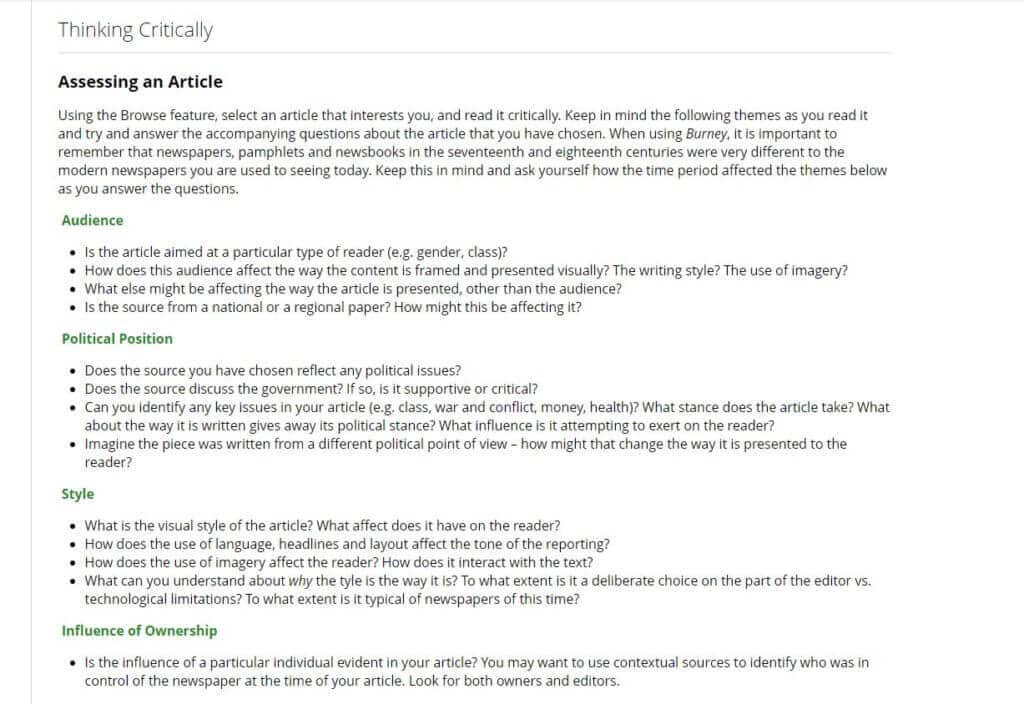
Exploring a Research Example in British Library Newspapers
In the Learning Center for British Library Newspapers, users will find a section of “Research Examples” in the “Read” workflow step. Through these research examples, the user is introduced to the topic, then invited to read the source and work through research questions at novice or advanced level, depending on their experience. The user will also find some suggested searches if they wish to explore the topic further.
One example focuses on a letter published in a newspaper written by Charles Dickens. He was appalled after witnessing a public execution and called for executions to only be conducted within prison walls. As well as being a famed author, Dickens campaigned for social issues, using his notoriety to bring attention to the causes he was passionate about.
![Left: Charles Dickens, Jeremiah Gurney. Left: Charles Dickens, Jeremiah Gurney, Public domain, via Wikimedia Commons Right: "LETTER OF Mr. CHARLES DICKENS ON THE EXECUTION." Northern Star [1838], 17 Nov. 1849. British Library Newspapers](https://review.gale.com/wp-content/uploads/2022/08/Charles-Dickens-and-Letter-combined-1024x681.jpg)
Right: “LETTER OF Mr. CHARLES DICKENS ON THE EXECUTION.” Northern Star [1838], 17 Nov. 1849. British Library Newspapers, https://link.gale.com/apps/doc/Y3207551447/BNCN?u=webdemo&sid=bookmark-BNCN&xid=fef21ad3
Enhancing Your Searches in Eighteenth Century Collections Online
Searching for primary sources and navigating through digital archives can be overwhelming. Using broad search terms can generate thousands of results, which will need sifting through to discern whether documents are relevant to your research topic. To help with this, the Learning Centers provide useful guidance on how to efficiently search for primary sources related to your specific investigation.
General Search Tips
The “General Search Tips” section, found under the “Find” workflow step, provides you with a range of different examples of how to achieve search results that are specific to your research topic, particularly if you have a more complex query. These tips include the use of Boolean operators and proximity operators. What’s even more helpful, these tips can then be seen in action for specific research topics in the “Sample Topics and Searches” section, found under the “Conceptualize” workflow step.
For example, you might do a general search for “women”in Eighteenth Century Collections Online to kick start your research into eighteenth-century feminism, returning over 100,00 results that contain the word “women”, but not necessarily in relation to women’s rights. Instead, the “Sample Topics and Searches” section provides a range of more effective search phrases, some using nesting and proximity operators, to reduce your search results to no more than a few hundred which will be more relevant to your topic.
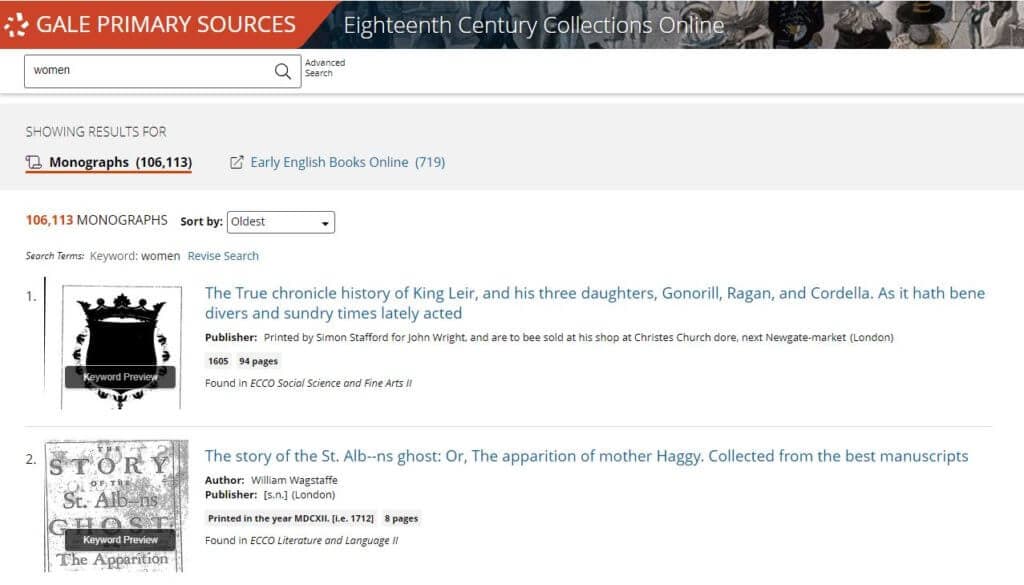
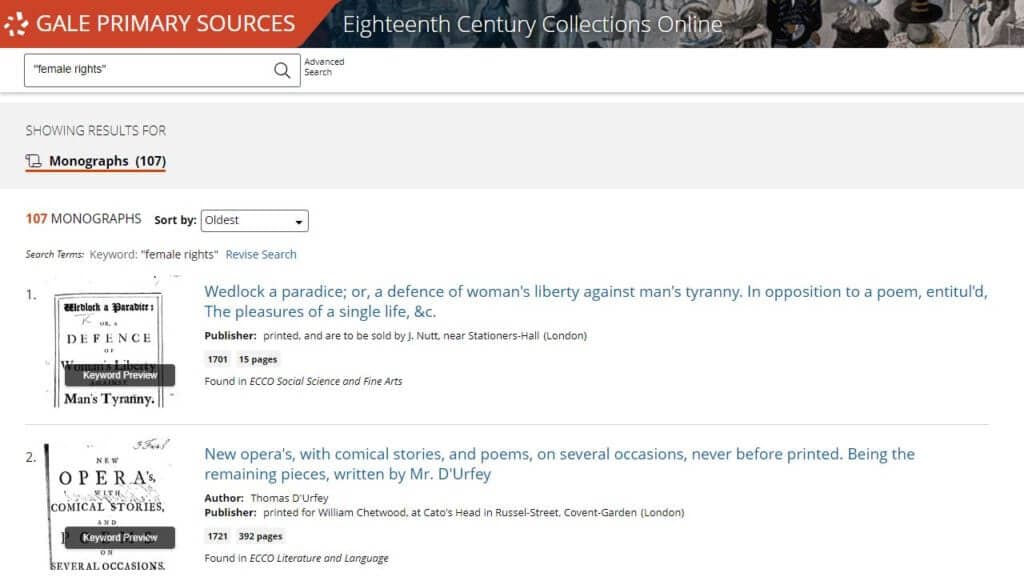
Utilising Filters
Furthermore, the “Search the Archive” section, located under the “Find” workflow step, demonstrates how utilising filters can also help to narrow down substantial search result returns, providing primary sources that are more suitable for your research topic. The “Search the Archive” section in the Learning Center for Eighteenth Century Collections Online highlights how using the “Search Within” and “Subject” filters can take your general search for “Empire” in your quest to find primary sources regarding British colonies in America, from 74,000 documents to 386.
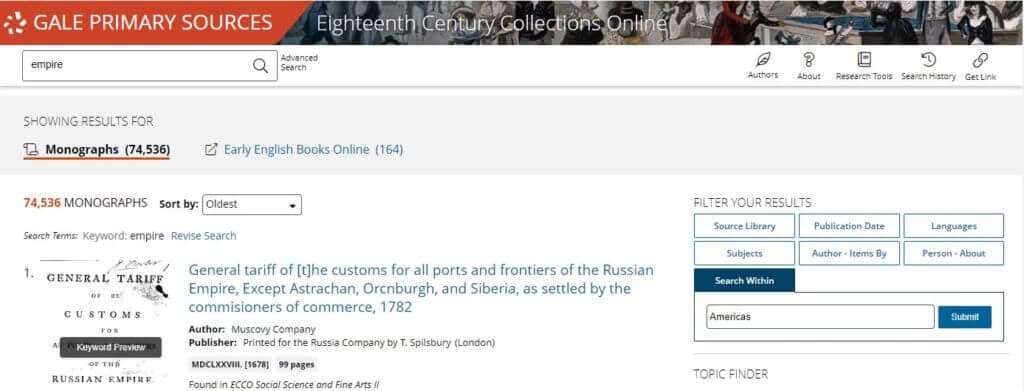
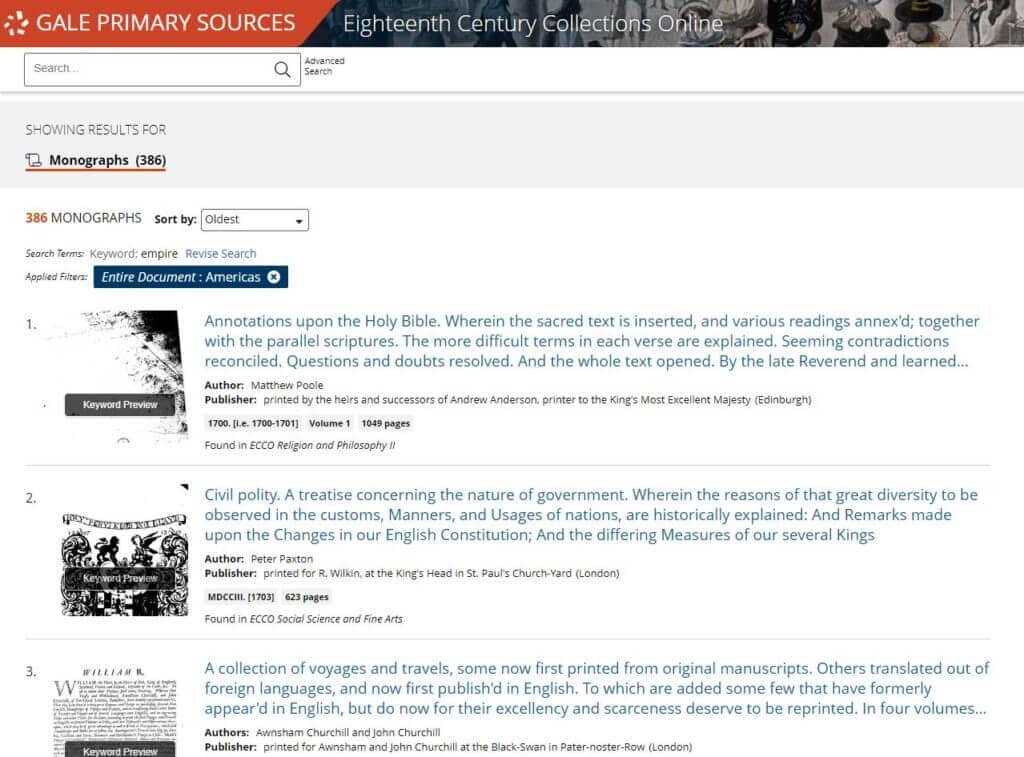
Gale is committed to supporting the teaching and learning needs of our users and we are excited to add these highly requested Learning Centers to these archives to enhance your experience and research.
If you enjoyed reading about the new Learning Centers in Gale Primary Sources archives, catch up on which archives were included in the first release here; read how they were developed by experienced Editors and Instructional Design experts here; and click here to learn about the research that went into the design of the feature.
To read more about how to develop research skills and primary source literacy, try:
- Moving from Undergraduate to Postgraduate Study: Using Digital Archives More Proficiently
- Using Primary Sources in Revision and Exam Preparation
- How To Handle Primary Source Archives – University Lecturer’s Top Tips
- How to Gather and Analyse Primary Sources for a Research Project
- Top 10 Tips for Teaching with Primary Sources
Blog post cover image citation: A design created to represent the Learning Center for The Times Literary Supplement Historical Archive in use by a student researcher.


